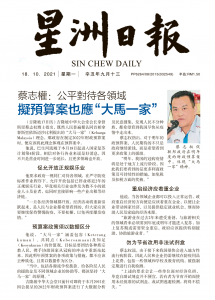KUALA LUMPUR – Datuk Seri Dr. KK Chai, President of the Kuala Lumpur Chinese Assembly Hall (KLCAH), said that since the Rakyat generally agreed with the concept of Keluarga Malaysia proposed by Prime Minister Datuk Seri Ismail Sabri Yaakob, the government should embody this concept in Budget 2022.
He said that the Klang Valley already moved to Phase Four of the National Recovery Plan from Oct 18, which was expected to be great news for all sectors, as not only were business hours further extended, but more sectors will reopen.
He urged the government to address all sectors with equal weight and reopen all proper entertainment industry, which has been closed for nearly two years, by strict compliance with the Covid-19 standard operating procedures. It is because the relevant industry involved an impressive number of workers and operators, which also give direct impact on the property rental and other economic chains.

“Once all economic sectors are reopened, economic activities will be revitalized, this is what people and businesses would like to see; but everyone should continue to be vigilant in epidemic prevention, in order to avoid another outbreak,” he said.
He said, Keluarga Malaysia included three characteristics which are Inclusivity (Keterangkuman), Common Ground (Kebersamaan), and Contentment (Kesyukuran). The aim is to unite citizens of all races and religions and come together to help our country revitalize from the impact of the outbreak. Therefore, the policies and initiatives in Budget 2022 should be racialized and differentiated by data.
“The principle of Keluarga Malaysia (Malaysian Family) should be adhered to, which including funding for all origin’s schools, aid to people from all walks, and support businesses in different fields, etc.”
Kuala Lumpur Chinese Assembly Hall (KLCAH) had conducted a big data analysis and national poll regarding the Budget 2022 to be presented in the Parliament on Oct 29, and results show that people, regardless of their race, would like to see our country recover from the pandemic as swiftly as possible.
Datuk Seri Dr. KK Chai indicated that for next year’s Budget, the citizens are not only hoping for the government to grant aid continuously, but also to expect more assistance in terms of policies.
“The outbreak in Malaysia will be at the endemic stage next year. Therefore, what we hope to see is more business-friendly policies and sustainable initiatives such as tax exemptions and tax reduction as incentives.”

According to him, when businesses in all sectors are up and running, the government’s orientation on jump-starting economic growth should be focus on these businesses, so that they are able to pull country’s economies, and provide more job opportunities, which in turn will support people and their families to sustain their financial resources.
“There was a significant drop in tourism over the past two years and it seems like it will take until the end of the year or next year for the tourism-related industries to recover. Plus, the recovery might require funding to restart, the government should provide special assistance to help the tourism industry,” he said.
During the pandemic, the government had introduced a total of 8 economic stimulus packages, namely Prihatin Rakyat Economic Stimulus Package (Prihatin) and Prihatin SME Economic Stimulus Package (Prihatin PKS) with a total allocation of RM260 billion, Economic Recovery Plan (Penjana) with a total allocation of RM35 billion, Prihatin Supplementary Initiative Package (Kita Prihatin) totaling RM10 billion, Rakyat’s Protection Assistance Package (PERMAI) at RM15 billion, Strategic Programme to Empower the People and Economy (PEMERKASA) and Additional Strategic Programme to Empower the People and Economy (PEMERKASA+) at RM20 billion and RM40 billion, and the National People’s Well-Being and Economic Recovery Package (PEMULIH) of RM150 billion.


Government subsidies for Covid-19 self-test kits, Encouraging the national to epidemic independently
According to Datuk Seri Dr. KK Chai, as the country will soon enter the endemic stage, people and businesses will continue to spend on goods for disease prevention, including some field, schools, and educational institutions, where self-testing is mandatory on a regular basis.
“The requirements above will put a financial burden on some institutions, as self-test kits are not cheap after all. To save money, people will use unauthorized kits or attempts to avoid testing, and the gain is not worth the loss

